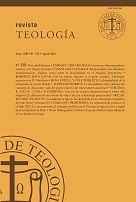The Separation of Powers in the Thirteenth Century An Approach to the Political Concept in the Tractatus de regia potestate et papali of John Quidort of Paris
DOI:
https://doi.org/10.46553/teo.58.135.2021.p163-182Palavras-chave:
Separación de Poderes, Poder real, Sociabilidad, Políticidad, Juan de ParisResumo
The work of John Quidort of París has a great influence by Tomás Aquinas and Cicero. However the proposals on the nature of the political power in these philosophers are different in some respects. In the present paper I will demonstrate the influences of both authors which help the quidort theory, not without-first-determining the dif- ferences and personal thesis of John of París at the first moment when the Parisian philosopher thinks the separation of powers' thesis at 13th century.Downloads
Referências
de Aquino Tomás. De regno ad regem Cypri, Trad. Tursi, A. Buenos Aires: Losada, 2003
von París, Johannes Quidort. Über kónigliche und papstliche Geivalt (De regia potestate et papali), Text kritische Edition mit deutscher Über setzung von F. BLEIENSTEIN, Sttutgart, E. Klett, 1969 of París, John. On Roy al and Papal Power, transí. J. A. WATT, Toron- to, The pontifical Institute of Mediaeval Studies, 1971
Bayona Aznar, Bernardo. «Marsílio de Pádua frente a los planteamientos dualistas de Juan de París y Dante favorables a la autonomía de poder temporal», Principios: Revista de Filosofía (UFRN), 12 (17-18). (2005)57-75.
Bertelloni, Francisco. «Una resignificación protomoderna del Estado (= regnum) en el tratado De potestate regia et papali de Juan Quidort de París», Scriptamediaevalia, 2(2). (2009): 55-48.
Bertelloni, Francisco. «Algunas reinterpretaciones de la causalidad final aristotélica en la teoría política medieval». Cader- nos de Historia e Filosofía da Ciencia, 3(15), 2. (2003): 343-371, http://cepame.fflch.usp.br/sites/cepame.fflch.usp.br/ files/ upload/ paginas/ BERTELLONI % 20Algunas % 20rein- terpretaciones % 20de % 201a % 20causalidad % 20final% 20aris- tot% C3 % A91ica.pdf
Black, Robert. «Republicanism» En L'Italiaalla fi ne del Medioevo: i car- atterioriginali nel quadro europeo - II., Firenze: Firenze UniversityPress. 2006
Ferreíro, Jazmín. «La recepción del naturalismo político aristotélico en la explicación del surgimiento del orden político en la Edad Media», Tesis de doctorado. Universidad de Buenos Aires, Facultad de Filosofía y Letras, 2010. http://repositorio, filo.uba.ar / handle / filodigital /1450
García, R.M. «La propiedad según Juan Quidort de París y Egidio Romano/ Ownership Accordingto John Quidort and Giles of Rome», Revista Española de Filosofía Medieval, 22 (2006): 181:192
Lecón, Mauricio. «La recepción de la Política de Aristóteles en De potestate regia et papali de Juan de París», Revista de Filosofía 85 (2017): 102-116
Owens, Joseph. «Aquinas as Aristotelian commentador». En Saint Thomas Aquinas on the Existence of God: The Collected Papers of Joseph Owens. New York: SUNY Press, 1980.
Primiterra, Emiliano. «Tomás de Aquino, el pensador político», Nuevo Pensamiento 4 n. 4 (2014): 395-418. http://www.editorialabiertafaia.com/ nuevopensamiento / índex.php/nuevopensamiento/article/ view/75/59
Tursi, Antonio. «Los fundamentos de la propiedad en el Tractatus de regia potestate et papali de Juan Quidort de París». Tesis de doctorado. Universidad de Buenos Aires, Facultad de Filosofía y Letras, 2009. http://repositorio, filo, uba.ar/handle/ filodigital/1442
Downloads
Publicado
Como Citar
Edição
Secção
Licença


















 Teología
Teología